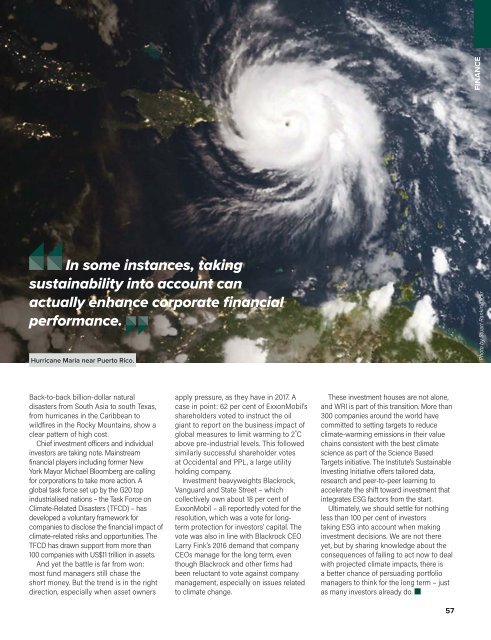Climate Action 2017-2018
Create successful ePaper yourself
Turn your PDF publications into a flip-book with our unique Google optimized e-Paper software.
FINANCE<br />
In some instances, taking<br />
sustainability into account can<br />
actually enhance corporate financial<br />
performance.<br />
Hurricane Maria near Puerto Rico.<br />
Photo by Stuart Rankin/flickr<br />
Back-to-back billion-dollar natural<br />
disasters from South Asia to south Texas,<br />
from hurricanes in the Caribbean to<br />
wildfires in the Rocky Mountains, show a<br />
clear pattern of high cost.<br />
Chief investment officers and individual<br />
investors are taking note. Mainstream<br />
financial players including former New<br />
York Mayor Michael Bloomberg are calling<br />
for corporations to take more action. A<br />
global task force set up by the G20 top<br />
industrialised nations – the Task Force on<br />
<strong>Climate</strong>-Related Disasters (TFCD) – has<br />
developed a voluntary framework for<br />
companies to disclose the financial impact of<br />
climate-related risks and opportunities. The<br />
TFCD has drawn support from more than<br />
100 companies with US$11 trillion in assets.<br />
And yet the battle is far from won:<br />
most fund managers still chase the<br />
short money. But the trend is in the right<br />
direction, especially when asset owners<br />
apply pressure, as they have in <strong>2017</strong>. A<br />
case in point: 62 per cent of ExxonMobil’s<br />
shareholders voted to instruct the oil<br />
giant to report on the business impact of<br />
global measures to limit warming to 2˚C<br />
above pre-industrial levels. This followed<br />
similarly successful shareholder votes<br />
at Occidental and PPL, a large utility<br />
holding company.<br />
Investment heavyweights Blackrock,<br />
Vanguard and State Street – which<br />
collectively own about 18 per cent of<br />
ExxonMobil – all reportedly voted for the<br />
resolution, which was a vote for longterm<br />
protection for investors’ capital. The<br />
vote was also in line with Blackrock CEO<br />
Larry Fink’s 2016 demand that company<br />
CEOs manage for the long term, even<br />
though Blackrock and other firms had<br />
been reluctant to vote against company<br />
management, especially on issues related<br />
to climate change.<br />
These investment houses are not alone,<br />
and WRI is part of this transition. More than<br />
300 companies around the world have<br />
committed to setting targets to reduce<br />
climate-warming emissions in their value<br />
chains consistent with the best climate<br />
science as part of the Science Based<br />
Targets initiative. The Institute’s Sustainable<br />
Investing Initiative offers tailored data,<br />
research and peer-to-peer learning to<br />
accelerate the shift toward investment that<br />
integrates ESG factors from the start.<br />
Ultimately, we should settle for nothing<br />
less than 100 per cent of investors<br />
taking ESG into account when making<br />
investment decisions. We are not there<br />
yet, but by sharing knowledge about the<br />
consequences of failing to act now to deal<br />
with projected climate impacts, there is<br />
a better chance of persuading portfolio<br />
managers to think for the long term – just<br />
as many investors already do.<br />
57












